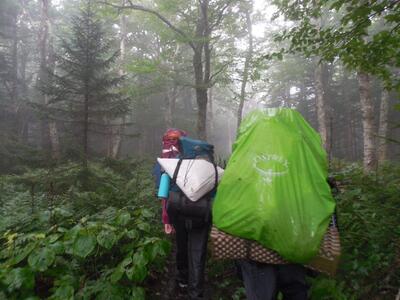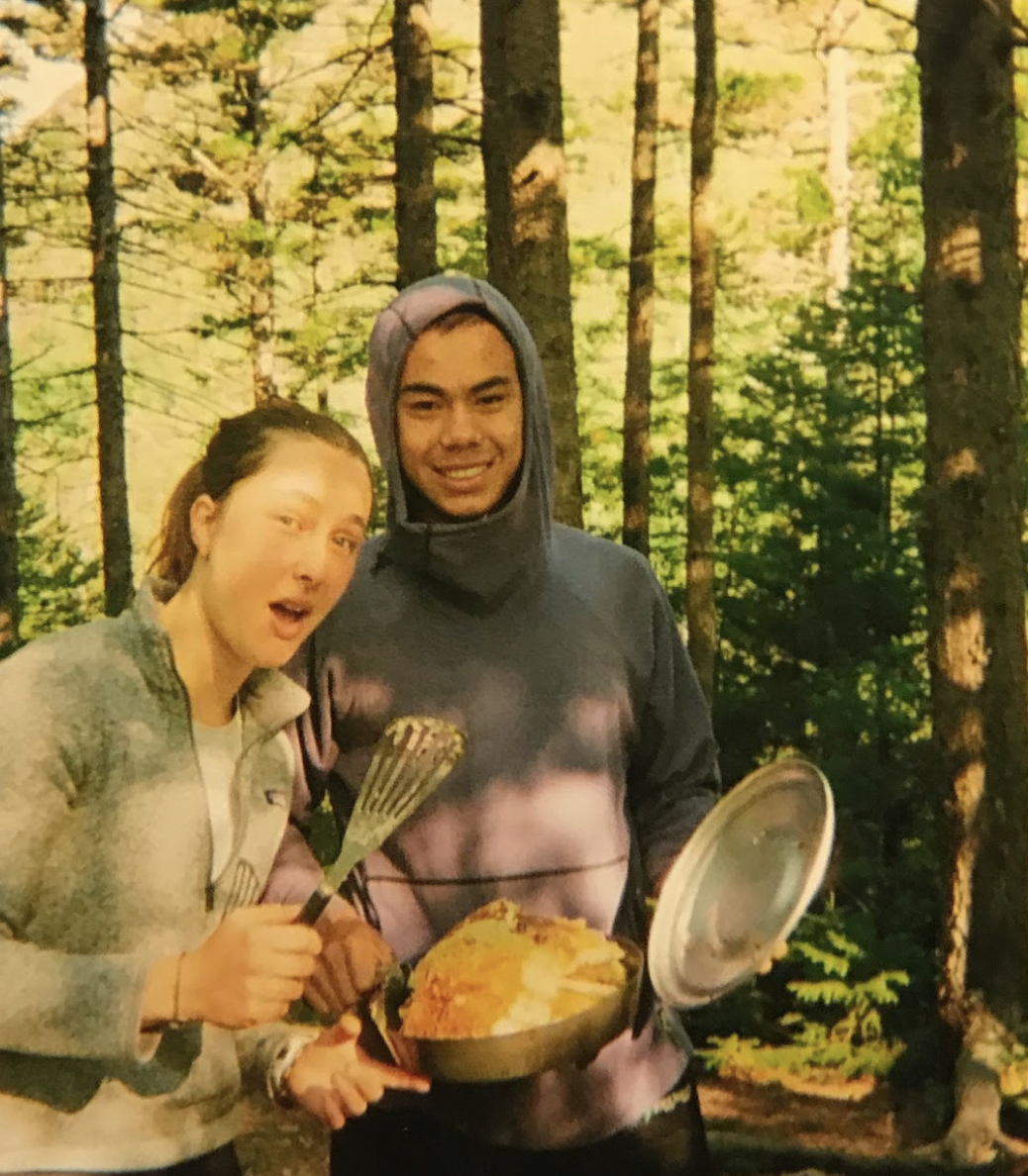Living in the woods is different than living in a house. Waking with the sun, walking through the trees, and sleeping under the stars all combine to make a special experience, but these differences do take a few days to get used to.
A Typical Day
You might be wondering what your days in the woods will look like! Well, look no  further! Check out this sample schedule (with very loose time frames).
further! Check out this sample schedule (with very loose time frames).
Soon after the sun rises:
- Rise and shine, it’s time to get ready for the day!
- Pack up your sleeping bag and personal belongings
- Pack up camp (tarps, bear bag, etc.)
- Breakfast!
- Finish packing your backpack with your personal and group gear
- Fill up water bottles
Most of the day:

- Get to know your fellow FOPpers
- Do things you didn't think you could
- Take some snack breaks
- Learn about how someone on your trip is different than you
- Eat lunch!
- Do something really cool
- Snack some more
- Learn something new about Harvard
- Realize you have something in common with someone else on your trip
- Challenge yourself
Before the sun gets too low:
- Hike on the trail, do some service work, or paddle in a canoe
- Get into camp
- Set up tarps
- Find a spot for the bear bag
- Purify water
- Enjoy a delicious dinner!
After the sun sets:
- Reflect on the day
- Clean up camp
- Get ready for bed
- Have a great conversation with the group
- Sleep well and get ready to do it again!
What We Eat
The following example days will give you a good idea of what food to expect on FOP trips. FOP creates menus to accomodate any and all dietary restrictions, including but not limited to: vegetarian, vegan, kosher, gluten free, dairy free etc! If you have any very specific dietary restrictions, please contact us so that we can discuss in detail how we can accommodate your needs.
| Breakfast | Lunch | Dinner | |
| Pancakes | Tortilla, peanut butter, and jelly | Pasta! | |
| Oatmeal | Pita bread, hummus, cheese | Burrito night! |
FOP trips also go out with a bunch of extra goodies and snacks including (but not limited to): Oreos, apples, oranges, granola bars, ramen noodles, tea, and GORP (a mix of peanuts, raisins, pretzels, dried apricots, dried pineapple, and chocolate chips).
Personal Hygiene
One aspect of life in the woods that is very different from front-country living is the lack of bathrooms and showers. Spending five 5 days in the wilderness includes learning how to keep clean when there aren't showers and going to the bathroom in the woods. But don't worry, for many participants FOP is the first time they have lived in the woods, so your leaders will explain everything you need to know to be comfortable. It is, however, important to be prepared to deal with certain situations (like having your period in the woods, dealing with contacts, and brushing your teeth) before you leave on your trip.
Eye Care
Wearing contact lenses on FOP may seem daunting, but it doesn't have to be. FOP carries biodegradable soap and you will have access to water (we have to for cooking and cleaning!). You may also bring a small hand towel and personal hand sanitizer if you want! In this way you will be able to clean your hands for removing and putting your contacts in. Also, make sure to bring an extra pair of contacts and/or glasses as well as plenty of solution for cleaning your contact lenses.
Oral Hygiene
Oral hygiene in the backcountry is pretty similar to the frontcountry! While you might not have running water, you can still brush your teeth so you should still bring a toothbrush and a small tube of toothpaste. However, if you are used to using mouthwash, you shouldn't bring it with you.
Scented Hygiene Products
We strongly recommend that you do not bring scented soap, or scented body lotion with you. There are several reasons for this. Animals such as chipmunks, mice and black bears are attracted to the same delicious odors that you enjoy, and if they smell something good, they will bite through your pack in search of something to eat. FOP provides biodegradable soap, which helps keep us clean and has less impact on the environment than commercial soaps made with perfumes and phosphates. Also, wearing deodorant when you are hiking every day and not showering is not good for you because it traps sweat and the toxins it excretes under the surface of your skin. When this happens for days on end (say five), it can cause rashes or infections.
Menstrual Hygiene
Dealing with your period in the woods may sound like a bummer, but it doesn't have to be. Even if you are not expecting to get your period during the trip, bring adequate supplies anyway. The change in diet, the strenuous exercise, and spending a lot of time with other people who menstruate can all affect your cycle. This is even true if you use oral contraception. Your leaders will not have extra supplies, nor will you have access to a store, so come equipped! Here are a few suggestions for making yourself as comfortable and prepared as possible:
To create a “Backcountry Period Kit,” collect the following items:
- 1 small, dark colored, opaque bag or stuff sack
- 3 small Ziplock bags
- 1 travel pack of baby wipes (for cleaning purposes)
- A generous supply of tampons (Tampons without an applicator are ideal because they produce the least waste & take up the least space in your pack). A menstrual cup (ie. DivaCup) is also recommended to reduce waste and pack weight, but only use this option if you already own/are comfortable and familiar with using one.
Then follow these steps:
- Take the tampons (or pads) out of the box and put them all into one Ziplock bag to protect them from the rain.
- Put the travel pack of baby wipes inside a second Ziplock bag to ensure they stay moist.
- Keep the third Ziplock bag empty to use as a mini-garbage for used supplies. All dirty baby wipes, used tampons, and tampon wrappers should go into the garbage Ziplock. If you are concerned about odor, you can put a used tea bag in the garbage Ziplock.
- Put all three bags inside the opaque bag. Voila, you have a self-contained period kit! On the trail, you should keep this in an accessible part of your pack.
Another consideration for FOPpers who wipe after they pee is the option to bring a “pee rag”. Many FOPpers and leaders choose to bring a bandana to use as a pee rag (as opposed to “drip drying”). If you are well hydrated (as you should be), the pee rag will not have much odor at all, and when hung on your pack UV light from the sun will help to sterilize it. This is not required, but many FOPpers appreciate having the option! For folks who choose to use toilet paper, our Leave No Trace practices dictate that we should pack out all trash (including toilet paper!) and we provide sanitary ways to do so.
 Harvard First-Year Outdoor Program
Harvard First-Year Outdoor Program